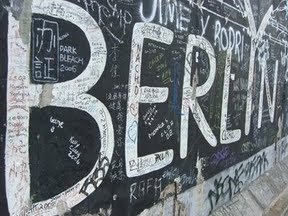On Thursday, we traveled to Terezin. For those of you who don't know, it was used as a concentration camp/ghetto during the Holocaust. When it comes to this horrible time in history, I have a pretty strong stomach for all of the gruesome topics thanks to Hank Greenspan's "Psychology of Holocaust Survivors" that I took this past year. I've seen the dead bodies, heard the spine curling stories, and felt the anger toward the human race, but being in this place was a stronger, more heart wrenching feeling than I bargained for.
The town is completely encased in walls and was built by the hands of workers in the camp. Much of it hasn't changed at all, except to accommodate the approximately 6,000 people that live in this town today. Even though people live in this area it still gives off the extreme ghost-town vibes. You don't see many people on the street and the buildings seem to be stuck in this time period. Of course it doesn't help that the entire town is built up of off shoots of the museum. They have replicated living quarters, the crematorium, the mass graves, and the art work of the children that were kept there before dying of "natural causes" or being moved to Auschwitz. How do they keep these aspects of the town true to history? One of the docents actually lived there before he was moved to Auschwitz. He's 90 years old and still gives tours!
After I've gone through a college course and this trip, I've started to think about how Michigan public schools teach the topic of the Holocaust. I suppose I can't speak for all of them, but in my high school the Holocaust was taught with very specific intentions, ignoring the majority of the story. This wouldn't enrage me as much if it was covered more in-depthly during our AP History classes, which I took part of. Until I got to college I knew the basic outline: Hitler comes to power, political prisoners, final solution, Auschwitz, genocide, every other country waits around for an obscene amount of time to do anything. Sound about right? I didn't know much, if anything about ghettos, the other concentration camps, the extent of forced labor (building a town to be imprisoned in!), or that so many artistic works were created during this time. End rant.
Basically, this little side trip increased my knowledge immensely and I am of the belief that EVERYONE should go to a concentration camp/death camp/ghetto at one point in their lives to make them more aware or educated or even cultured. It's worth the emotional roller coaster.

No comments:
Post a Comment